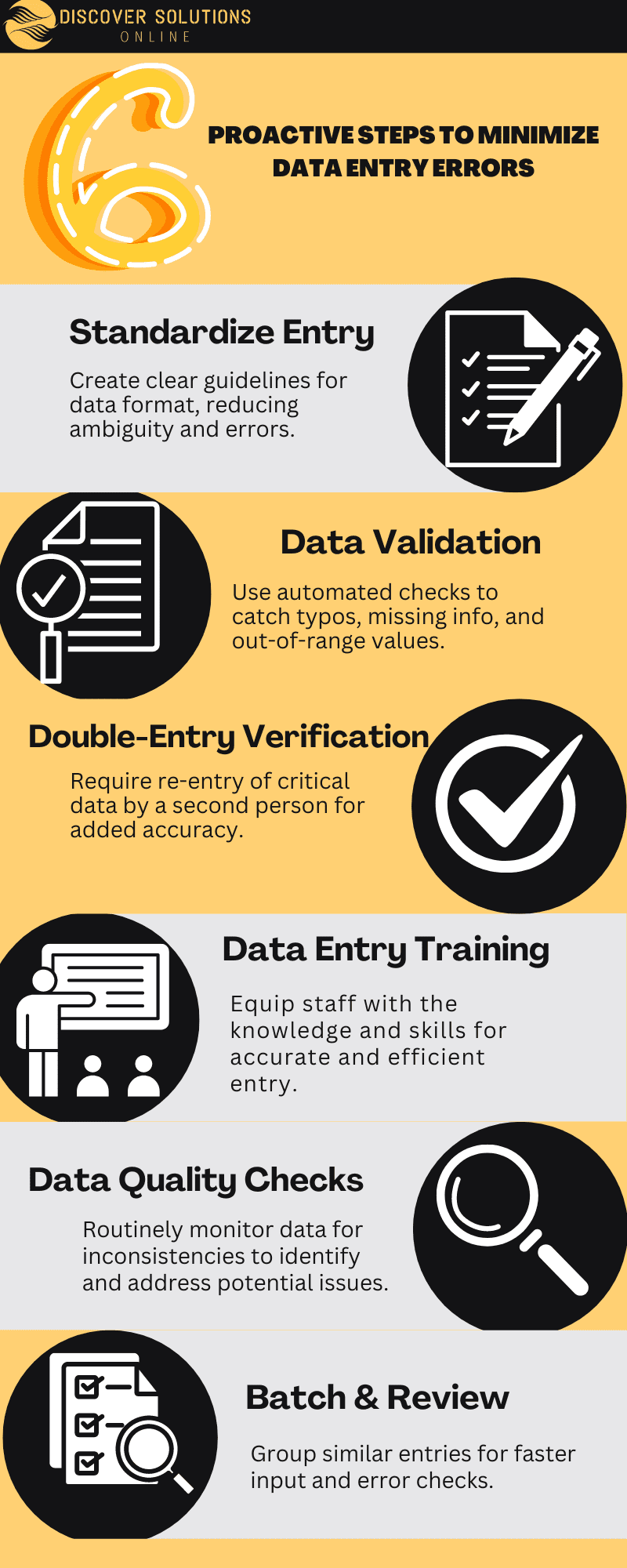Avoiding costly mistakes in legal data entry is paramount due to the negative impacts inaccuracies can have on various aspects of legal proceedings. Inaccurate legal data entry can lead to delays in case proceedings, resulting in wasted time and resources for all parties involved.
Moreover, it can undermine the credibility of legal professionals and their clients, raising doubts about the accuracy and integrity of their representations. Inaccurate data entry may also have legal consequences, ranging from sanctions for contempt of court to adverse judgments or settlements. Financially, the costs associated with rectifying errors and potential liabilities stemming from inaccuracies can be substantial. Therefore, prioritizing accuracy and implementing robust quality control measures in legal data entry processes is essential to mitigate these negative impacts and uphold the integrity of the legal system.
Legal Ramifications of Inaccurate Data Entry in Court Filings
In the intricate world of law, accuracy is paramount. Whether it’s a simple typo or a more substantial error, inaccuracies in legal documents can have far-reaching consequences. Inaccurate data entry in court filings, in particular, can lead to significant legal ramifications, affecting the outcome of cases and potentially damaging the reputation of the involved parties. This article delves into the negative impacts of such inaccuracies and the importance of maintaining precision in legal data entry processes.
Impacts on Case Proceedings
Legal proceedings rely heavily on the accuracy of filed documents. Even minor errors can cause delays in court proceedings, leading to wasted time and resources for all parties involved. Inaccurate data entry may result in the rejection of filings, necessitating corrections and resubmissions. Such delays can prolong the resolution of disputes, adding to the financial and emotional burden of litigants.
Furthermore, inaccurate data entry can lead to misunderstandings or misinterpretations of key information by judges, juries, or opposing counsel. This can derail the progress of a case, requiring additional hearings or clarifications to rectify the errors. In some instances, inaccuracies in court filings may prompt the court to dismiss or strike certain claims or defenses, significantly impacting the legal strategy and potential outcomes for the parties involved.
Loss of Credibility
Accuracy is a cornerstone of credibility in the legal profession. Attorneys and their clients rely on court filings to accurately reflect the facts and arguments of a case. Inaccuracies in legal documents undermine the credibility of the filer and may raise doubts about the integrity of their representations. Judges and opposing counsel may view inaccuracies as signs of negligence or incompetence, potentially harming the reputation of the involved attorneys and their clients.
Moreover, repeated instances of inaccurate data entry can damage the reputation of law firms or legal departments, affecting their ability to attract clients and maintain professional relationships. Clients expect their legal representatives to demonstrate competence and attention to detail, and the discovery of filing errors can erode trust and confidence in the legal services provided.
Potential Legal Consequences
Inaccurate data entry can have legal consequences beyond the immediate case proceedings. False or misleading information submitted to the court may constitute perjury or contempt of court, exposing the responsible party to sanctions or criminal charges. Additionally, inaccuracies in legal documents can weaken the legal position of the filer, making it more difficult to prevail in court. Adverse outcomes resulting from such errors can have lasting repercussions for the parties involved.
For example, if a party submits inaccurate financial information in support of a motion or petition, it may lead to allegations of fraud or misrepresentation. Courts take such allegations seriously and may impose severe penalties on the responsible party, including monetary sanctions, adverse judgments, or even criminal prosecution in cases of egregious misconduct.
Financial Costs
The financial costs of inaccurate data entry in court filings can be significant. Rejected filings, motions for correction, and legal challenges stemming from inaccuracies require additional time and resources to rectify. Attorneys may need to spend extra billable hours addressing errors, while clients may incur expenses associated with court fees, penalties, and potential settlements resulting from adverse outcomes. Inaccuracies can also lead to missed deadlines or opportunities, further escalating costs for all parties involved.
Furthermore, inaccuracies in court filings can result in adverse financial consequences for clients, such as lost opportunities for recovery or increased liability exposure. In cases involving monetary damages, inaccuracies in calculating or presenting financial information can lead to suboptimal outcomes or missed opportunities for settlement negotiations.
Loss of Legal Rights
Inaccurate data entry in court filings can jeopardize the legal rights of litigants. Errors in identifying parties, specifying claims or defenses, or citing relevant statutes or case law may undermine the legal arguments presented. In some cases, inaccuracies may result in the waiver of important legal rights or defenses, depriving litigants of opportunities to assert their interests effectively. The failure to accurately present facts and legal arguments can significantly impact the outcome of a case, potentially leading to unfavorable judgments or settlements.
For instance, if a party fails to accurately assert affirmative defenses or counterclaims due to data entry errors, they may forfeit important legal protections or opportunities for recovery. Similarly, inaccuracies in the description of factual allegations or legal theories may weaken the party’s position and make it more difficult to persuade the court of the merits of their case.
Reputation at Stake
Apart from the direct legal repercussions, inaccuracies in court filings can also jeopardize the reputations of those involved. Within the legal sphere, information spreads rapidly, and any instances of filing errors or unfavorable outcomes can cast doubt on the credibility of both attorneys and their clients. Persistent inaccuracies may undermine confidence in the expertise and dependability of legal professionals, impairing their capacity to acquire new clients and uphold existing professional connections. In the legal realm, reputation holds immense value, and the repercussions of filing errors can linger, impacting future career prospects and avenues for business growth.
Moreover, reputational damage resulting from inaccuracies in court filings can extend beyond the immediate parties to the litigation. Adverse publicity or negative perceptions of a party’s conduct in litigation can impact their standing in the broader legal community and among potential business partners or stakeholders.
Ethical Implications
Legal professionals have a duty to uphold ethical standards in their practice. Inaccurate data entry in court filings may violate ethical rules governing honesty, competence, and diligence. Attorneys are obligated to ensure the accuracy and integrity of the documents they submit to the court, reflecting their commitment to serving the interests of justice and upholding the rule of law. Failure to meet these ethical obligations can result in disciplinary action by regulatory authorities, further compounding the consequences of filing errors.
Ethical violations related to inaccurate data entry may subject attorneys to disciplinary proceedings before state bar associations or other regulatory bodies. Depending on the severity of the misconduct, sanctions may range from reprimands or fines to suspension or disbarment from the practice of law. In addition to the professional consequences, ethical lapses can damage the attorney’s reputation and erode public trust in the legal profession.

Financial Losses Due to Billing Errors or Misplaced Data
In the complex landscape of legal operations, the accuracy of billing and data management stands as a cornerstone of financial stability. However, errors in these areas can lead to substantial financial losses for law firms, legal departments, and their clients. This section delves into the multifaceted ways in which billing errors and misplaced data can result in significant financial ramifications, alongside strategies for mitigating these costly mistakes.
Overbilling
Overbilling represents a significant financial risk for legal practices, as it involves charging clients for services not rendered or inflating billable hours. Clients may dispute overbilled amounts, leading to strained relationships and potential revenue loss. Furthermore, overbilling can tarnish the firm’s reputation, damaging client trust and resulting in lost business opportunities. Rectifying overbilling errors requires time and resources, further impacting the firm’s financial health.
Underbilling
Underbilling, or failing to accurately record billable hours or expenses, results in revenue leakage for legal practices. When services are provided but not properly invoiced, the firm misses out on rightful compensation. Underbilling not only affects current revenue but also hampers the firm’s ability to forecast future earnings accurately. Additionally, clients may question the firm’s competence and reliability, leading to reputational damage and potential client loss.
Incorrect Rates
Applying incorrect billing rates or codes can lead to billing discrepancies and financial losses. Clients expect accurate and transparent billing practices, and discrepancies may result in delayed payments or disputes. Incorrect rates also impact revenue forecasting and budgeting, as they distort the firm’s financial performance metrics. To mitigate the risk of incorrect rates, firms should implement robust billing systems and conduct regular audits to ensure billing accuracy.
Duplicate Billing
Duplicate billing, where clients are billed multiple times for the same service or expense, erodes client trust and damages the firm’s reputation. Clients may feel exploited or misled, leading to strained relationships and potential legal disputes. Duplicate billing also results in administrative overhead, as firms must invest time and resources to rectify billing errors and reconcile accounts. Implementing stringent billing controls and conducting regular audits can help prevent duplicate billing and mitigate its financial impact.
Missed Revenue Opportunities
Misplaced or inaccurately entered data can lead to missed revenue opportunities for legal practitioners. Inaccurate timekeeping or expense tracking may result in underreporting of billable hours or services, leading to lost revenue. Additionally, missed deadlines for invoicing or collection efforts delay revenue realization and affect cash flow. Firms must invest in robust data management systems and provide comprehensive training to staff to ensure accurate data entry and maximize revenue capture.
Resource Wastage
Billing errors and misplaced data contribute to resource wastage within legal practices. Inefficient billing processes consume valuable administrative time and manpower, diverting resources from core legal activities. Misplaced data hampers case management efficiency, leading to wasted time and duplicated efforts. Firms must streamline billing processes and invest in technology solutions to enhance data management efficiency and minimize resource wastage.
Legal Liability
Billing errors or misplaced data may expose legal practitioners to legal liability and financial penalties. Clients aggrieved by billing errors may pursue legal action for breach of contract, fraud, or professional negligence. Regulatory authorities may impose fines or sanctions on firms found to have engaged in unethical billing practices. Legal liability not only results in financial losses but also damages the firm’s reputation and undermines client trust. Firms must adhere to ethical billing practices and regulatory requirements to mitigate the risk of legal liability and safeguard their financial interests.
Damage to Reputation and Client Trust from Data Inaccuracies
In the legal industry, reputation and client trust are invaluable assets. However, inaccuracies in legal data entry can significantly damage both. This section explores how data inaccuracies can tarnish the reputation of legal professionals and erode the trust that clients place in their services.
Reputation Damage
Inaccuracies in legal data entry can severely impact the reputation of legal professionals and firms. Clients expect accuracy and precision in all aspects of legal representation, including data management. When inaccuracies occur, whether in court filings, contracts, or other legal documents, it reflects poorly on the professionalism and competence of the legal practitioner.
Repeated instances of data inaccuracies can lead to a perception of unreliability and incompetence, damaging the reputation of the individual attorney or the firm as a whole. Negative word-of-mouth spreads quickly in the legal community, potentially leading to a loss of clients and opportunities for new business. Moreover, reputation damage resulting from data inaccuracies can be difficult to repair, requiring significant time and effort to rebuild trust and credibility.
Client Trust Erosion
Client trust is the foundation of successful attorney-client relationships. However, data inaccuracies can erode this trust, leading to strained relationships and potential loss of business. Clients rely on legal professionals to handle their sensitive information with care and accuracy. When inaccuracies occur, clients may question the integrity and reliability of the legal services provided.
Data inaccuracies can also undermine the confidence that clients have in the legal advice and representation they receive. Clients may become wary of the accuracy of legal documents prepared on their behalf or the reliability of information provided by their attorneys. This erosion of trust can lead to dissatisfaction, disputes, and ultimately, the loss of valuable clients.
Impact on Client Relationships
Data inaccuracies not only damage reputation and erode trust but also strain client relationships. Clients expect open communication and transparency from their legal representatives. When inaccuracies occur, it can lead to misunderstandings, frustration, and breakdowns in communication.
Clients may feel misled or deceived if they discover inaccuracies in legal documents or information provided by their attorneys. Such feelings of mistrust can be difficult to overcome and may result in clients seeking legal representation elsewhere. Additionally, resolving disputes arising from data inaccuracies can strain client relationships and damage the long-term viability of the attorney-client partnership.
Loss of Business Opportunities
The negative impacts of data inaccuracies extend beyond immediate client relationships to potential business opportunities. Reputation damage resulting from inaccuracies can deter prospective clients from seeking legal services from the affected attorney or firm. Negative word-of-mouth and online reviews can dissuade potential clients from engaging with a legal practitioner, leading to a loss of business opportunities.
Moreover, inaccuracies in legal documents or information provided to prospective clients can undermine their confidence in the professionalism and competence of the attorney. This loss of confidence can result in potential clients seeking legal services elsewhere, depriving the attorney or firm of valuable business opportunities.
Long-Term Reputational Harm
The consequences of data inaccuracies can have long-lasting effects on the reputation and success of legal professionals and firms. In today’s digital age, information spreads quickly, and reputational harm resulting from inaccuracies can be difficult to contain. Negative reviews, social media posts, and online forums can perpetuate negative perceptions of an attorney or firm, impacting their ability to attract new clients and retain existing ones.
Moreover, reputational harm resulting from data inaccuracies can affect career prospects and business opportunities for legal professionals. Negative associations with inaccuracies may follow an attorney throughout their career, impacting their ability to secure employment or establish successful practices. Therefore, it is crucial for legal professionals to prioritize accuracy and diligence in all aspects of data entry to avoid reputational harm and maintain the trust and confidence of their clients.
Time Wasted on Rectifying Errors and Revisiting Cases
Inaccurate legal data entry not only incurs financial costs but also results in significant time wastage for legal professionals. This section delves into the intricate challenges posed by errors in data entry, exploring the identification of errors, rectification processes, the necessity of revisiting cases, delays in case proceedings, impact on productivity and efficiency, opportunity costs, and strategies for mitigation.
Identifying Errors
Identifying errors in legal data entry is akin to finding a needle in a haystack. Legal professionals are tasked with navigating vast volumes of documents and data to pinpoint inaccuracies. This process often requires meticulous scrutiny, cross-referencing, and analysis, consuming valuable time and resources. Moreover, errors may manifest in various forms, ranging from typographical errors and data entry mistakes to substantive inaccuracies in legal documents. Each error must be meticulously documented and verified to ensure accurate rectification, further prolonging the identification process.
Rectification Processes
Rectifying errors in legal data entry is a multifaceted process that demands meticulous attention to detail and adherence to procedural requirements. Once errors are identified, legal professionals must undertake rectification efforts, which may involve amending legal documents, revising filings, or updating databases. Each rectification step requires careful documentation, coordination with relevant stakeholders, and compliance with regulatory standards. Moreover, rectification efforts may span across multiple departments within a legal practice, necessitating effective communication and collaboration. As a result, rectification processes can be time-consuming, complex, and resource-intensive, prolonging the timeframe for error resolution.
Revisiting Cases
Inaccurate legal data entry can necessitate revisiting previously closed cases or matters, adding another layer of complexity and time wastage for legal professionals. Discovering inaccuracies in historical data or documents may require legal practitioners to reopen cases and conduct thorough reviews. Revisiting cases entails retrieving archived documents, analyzing past correspondence, and reassessing legal strategies. This retrospective analysis not only consumes time but also disrupts workflow and diverts resources from ongoing matters. Moreover, revisiting cases may unearth additional errors or inconsistencies, further prolonging the rectification process and exacerbating time wastage.
Delays in Case Proceedings
The time wasted on rectifying errors and revisiting cases can lead to delays in case proceedings, with far-reaching consequences for all parties involved. Court deadlines may be missed, hearings rescheduled, or negotiations prolonged, prolonging the duration and cost of legal proceedings. Delays in case resolution can impact client satisfaction, strain attorney-client relationships, and erode trust in legal representation. Moreover, prolonged litigation incurs additional expenses in the form of legal fees, court costs, and resource allocation, further exacerbating the financial burden on legal practices.
Impact on Productivity and Efficiency
Inaccurate legal data entry undermines productivity and efficiency within legal practices, diverting valuable time and resources away from core legal activities. Legal professionals must devote disproportionate efforts to rectifying errors and revisiting cases, leaving fewer resources available for strategic planning, client communication, and professional development. Moreover, the mental strain and frustration associated with error rectification can impact morale and motivation, further impeding productivity and efficiency. As a result, legal practices may struggle to meet deadlines, deliver quality legal services, and maintain competitive edge in the marketplace.
Opportunity Costs
The time wasted on rectifying errors and revisiting cases represents a missed opportunity for legal professionals to focus on value-added activities. Instead of investing time in error-prone data entry processes, legal professionals could allocate resources to client relationship management, business development, or legal research and analysis. By reducing time wastage on rectification efforts, legal practices can enhance productivity, optimize resource allocation, and capitalize on growth opportunities. However, the failure to address time wastage effectively can result in opportunity costs, hindering the long-term success and sustainability of legal practices.
Strategies for Reducing Errors
To mitigate the time wasted on rectifying errors and revisiting cases, legal practices must prioritize accuracy and efficiency in data entry processes. Implementing robust quality control measures, such as double-checking data entry, conducting regular audits, and leveraging technology solutions, can help minimize errors and streamline rectification efforts.
Moreover, investing in training and professional development initiatives can enhance the skills and proficiency of legal professionals in data management practices, reducing the likelihood of errors and improving overall efficiency. Additionally, fostering a culture of continuous improvement and innovation within legal practices can empower employees to identify inefficiencies and implement solutions to streamline processes and mitigate time wastage effectively.
Potential Legal Liabilities from Legal Data Entry Negligence
Inaccurate legal data entry isn’t just a matter of inconvenience or inefficiency; it can also lead to significant legal liabilities for law firms and legal practitioners. This section explores the various ways in which data entry negligence can result in legal liabilities, the potential consequences, and strategies to mitigate these risks.
Breach of Contract
One of the most immediate legal liabilities stemming from data entry negligence is the risk of breaching contractual obligations. Legal agreements often include provisions regarding the accuracy and completeness of information provided. If inaccuracies in data entry lead to errors in contracts or agreements, it could constitute a breach of contract. Parties to the contract may suffer financial losses or other damages as a result, leading to potential lawsuits and legal claims against the negligent party.
Professional Negligence
Legal professionals have a duty of care to their clients to provide competent and diligent representation. Negligence in data entry can constitute professional malpractice if it leads to errors or omissions that harm the client’s interests. For example, if inaccurate data entry results in missed deadlines, incorrect legal advice, or other detrimental outcomes for the client, the legal practitioner may be held liable for professional negligence. This can result in legal claims for damages, disciplinary actions, and reputational harm.
Fraudulent Misrepresentation
Inaccurate data entry that intentionally misrepresents facts or conceals material information can also give rise to claims of fraudulent misrepresentation. If a party relies on false or misleading information provided through data entry and suffers harm as a result, they may pursue legal action against the responsible party for fraudulent misrepresentation. Legal liabilities arising from fraudulent misrepresentation can be severe, including potential criminal charges, civil penalties, and damages awards.
Violation of Privacy Laws
Data entry negligence can also result in legal liabilities related to the violation of privacy laws and regulations. Legal professionals are entrusted with sensitive information about clients, opposing parties, and other stakeholders. Failure to accurately record, protect, and secure this information can lead to breaches of privacy laws such as the General Data Protection Regulation (GDPR) or the Health Insurance Portability and Accountability Act (HIPAA). Violations of privacy laws can result in significant fines, legal penalties, and reputational damage for law firms and legal practitioners.
Mistakes in Court Filings
Inaccuracies in data entry can have particularly severe consequences when it comes to court filings. Errors or omissions in court documents can result in adverse legal rulings, dismissal of cases, or even sanctions against the legal practitioner or law firm. Courts have strict rules and procedures regarding the accuracy and completeness of filings, and failure to adhere to these requirements due to data entry negligence can lead to legal liabilities, including malpractice claims and disciplinary actions.
Regulatory Non-Compliance
Legal professionals are subject to various regulatory requirements governing their conduct and practices. Inaccuracies in data entry that result in regulatory non-compliance can lead to legal liabilities and sanctions from regulatory authorities. For example, failure to accurately report financial transactions or maintain proper records may violate regulations imposed by agencies such as the Securities and Exchange Commission (SEC) or the Financial Industry Regulatory Authority (FINRA). Regulatory non-compliance can result in fines, license revocation, and other disciplinary measures.
Customer Disputes and Litigation
Inaccurate data entry can also give rise to disputes and litigation with clients or other parties affected by the errors. Clients who suffer harm or financial losses due to data entry negligence may pursue legal action against the responsible legal practitioner or law firm. This can result in costly litigation, damages awards, and reputational damage. Moreover, customer disputes stemming from data entry errors can strain client relationships and lead to loss of business opportunities.
Damage to Reputation and Brand
Beyond the immediate legal liabilities, data entry negligence can also cause lasting damage to the reputation and brand of legal practitioners and law firms. Negative publicity resulting from lawsuits, regulatory actions, or customer disputes can tarnish the reputation of the firm and undermine trust and confidence in its services. Rebuilding trust and repairing reputational damage can be a lengthy and costly process, impacting the firm’s ability to attract clients and retain talent.
Mitigation Strategies
To mitigate the potential legal liabilities arising from data entry negligence, legal practitioners and law firms must implement robust policies, procedures, and controls. This includes establishing quality control measures such as double-checking data entry and conducting regular audits to ensure accuracy. Comprehensive training and education on data entry best practices and regulatory requirements should be provided to all staff members.
Discover Solutions Online’s Approach to Legal Data Entry
Precision in Legal Data Entry
Discover Solutions Online prides itself on its meticulous approach to legal data entry. We understand that even the smallest error in legal documentation can have significant consequences, which is why we prioritize precision in every data entry task we undertake. Our team is trained to pay attention to detail and adhere to strict quality control standards to ensure the accuracy and integrity of all data entered.
Tailored Solutions
We take a personalized approach to addressing the unique needs and challenges of each client. Our solutions are tailored to the specific requirements of legal practices, taking into account factors such as the volume of data, types of documents, and regulatory compliance requirements. Whether our clients require ongoing data entry support or assistance with a one-time project, we work closely with them to develop customized solutions that meet their needs.
Skilled Professionals
Our team of legal data entry professionals is comprised of highly skilled individuals with extensive experience in the legal field. Many of our team members have backgrounds in law or paralegal studies, giving them a deep understanding of legal terminology, procedures, and documentation requirements. They undergo rigorous training to ensure they are equipped with the knowledge and skills needed to accurately handle a wide range of legal documents and data entry tasks.
Focus on Client Service
At Discover Solutions Online, client satisfaction is our top priority. We strive to provide exceptional service at every step of the data entry process, from initial consultation to final delivery. Our team is responsive, reliable, and committed to meeting deadlines and exceeding expectations. We understand the importance of clear communication and transparency, and we keep our clients informed and involved throughout the data entry process.
Upholding Professional Standards
As a trusted provider of legal data entry services, we are committed to upholding the highest professional standards in everything we do. We adhere to industry best practices and regulatory requirements to ensure compliance and integrity in our data entry processes. Our team is dedicated to delivering accurate, reliable, and high-quality results that meet the expectations of our clients and reflect positively on their reputation and brand.
Comprehensive Quality Assurance
At Discover Solutions Online, we implement a comprehensive quality assurance process to ensure the accuracy and reliability of our legal data entry services. Our dedicated quality assurance team conducts thorough reviews and checks at multiple stages of the data entry process to identify and correct any errors or discrepancies. We employ a combination of manual checks and automated tools to verify the accuracy of data entry, ensuring that every piece of information is entered correctly and consistently. By maintaining strict quality control standards, we minimize the risk of errors and discrepancies, providing our clients with confidence in the integrity of their legal documentation.
In conclusion, the legal ramifications of inaccurate data entry in court filings are profound and multifaceted. From impeding case proceedings to damaging reputations and incurring financial costs, inaccuracies can have far-reaching implications for litigants, attorneys, and the judicial system as a whole. To avoid these negative outcomes, legal professionals must prioritize accuracy and diligence in their data entry processes, employing rigorous quality control measures and leveraging technology solutions to minimize errors. By upholding the highest standards of accuracy and integrity, legal practitioners can enhance their credibility, protect their clients’ interests, and promote the efficient administration of justice.





